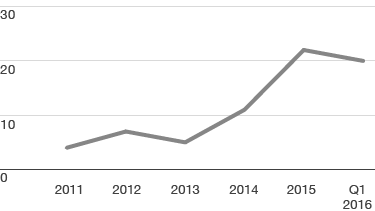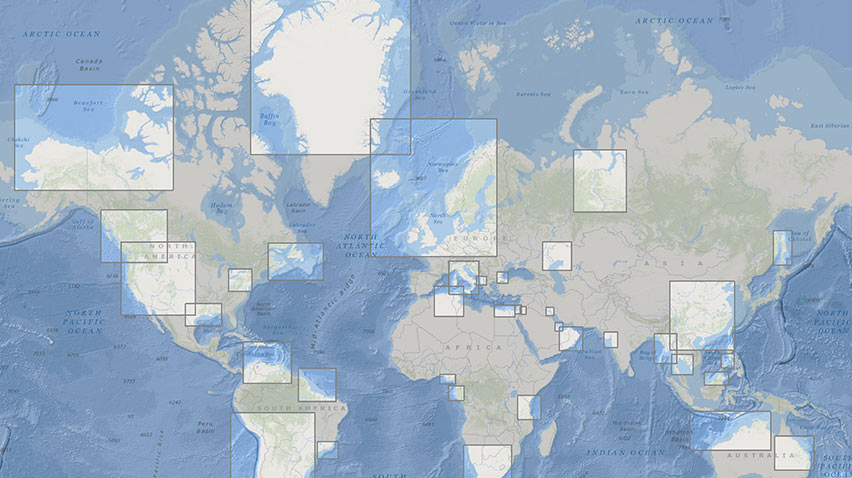Refining and trading (Oil Products)

Refining
We aim to create a Downstream portfolio that is more focused on larger, integrated refining and petrochemical sites that are better able to respond to tighter fuel specifications and growth opportunities.
A key part of our strategy is to divest non-core assets while selectively investing in high-growth markets. We have retained our larger and more integrated refineries, and our current portfolio is positioned for optimisation across the value chain.
We have interests in 23 refineries worldwide. They have the capacity to process a total of around 3.1 million barrels of crude oil per day (Shell share) into a wide range of products, including gasoline, diesel, heating oil, aviation fuel, marine fuel, lubricants, liquefied petroleum gas (LPG), sulphur and bitumen. Approximately 34% of our refining capacity is in Europe and Africa, with 39% in the Americas and 27% in Asia and Oceania.
In Canada, we took the FID for a debottlenecking project at Scotford refinery, which will increase its hydrocracking capacity by about 20%
Efficiency improvements have contributed to a reduction in greenhouse gas emissions from our refineries and petrochemicals plants. Achieving even greater efficiency and operational reliability will also help us improve profitability. The average availability of our refineries, a measure of their operational performance, was 90% in 2015.
In Canada, we took the FID for a debottlenecking project at Scotford refinery, which will increase its hydrocracking capacity by about 20%. Completion is expected in 2016. In the Netherlands, we took the FID to build a major unit at the Pernis refinery. The new solvent deasphalter unit will remove heavier fractions from crude oil, allowing the refinery to upgrade a larger proportion of its oil intake into lighter, high-grade products. Construction work is planned to start later in 2016, subject to permit approvals, with completion expected by the end of 2018.
We completed the sale of the Harburg refinery in Germany to Nynas at the end of 2015. The transaction was agreed in 2011, and a first phase to hand over the base oil plant was completed in 2014. Additionally, we are seeking to sell our Fredericia refinery in Denmark.
We reached a conditional agreement to sell our 51% shareholding in the Shell Refining Company in Malaysia to Malaysia Hengyuan International Ltd. The transaction is expected to complete in 2016, subject to obtaining regulatory approval.
Trading and supply
Shell Trading and Supply is a global organisation combining our network of trading companies, industry-leading shipping and maritime capabilities, and an integrated network of supply and distribution activities. Our global Trading business has the capability to provide consumers and industrial customers with a range of products from natural gas, electricity and crude oil, to refined products and chemical feedstocks. Shell Trading companies operate around the world, with the largest trading and marketing locations in London, Houston, Singapore, Dubai and Rotterdam.
Oil Products ROACE [A]
%

[A] Earnings on CCS basis, excluding identified items.
Shell Shipping and Maritime has a high level of expertise and decades of experience. It is responsible for ensuring that all of our global maritime activities are safely managed, including ships, barges, drilling rigs, supply boats, FPSOs, FSRUs, SBMs and the related operations that take place in ports and terminals. 2,000 vessels associated with Shell are on the water on any given day.
With more than 100 distribution terminals and 770 supply points in around 25 countries, our supply and distribution infrastructure is well positioned to make deliveries around the world. This includes supplying feedstocks for our refineries and chemical plants and finished products such as gasoline, diesel and aviation fuel to our Marketing businesses and customers.
Shell Wholesale Commercial Fuels provides transport, industrial and heating fuels. Our range of products, from reliable main-grade fuels to premium products, can offer tangible benefits. These include fuel economy, enhanced equipment performance, reductions in maintenance frequency and costs as well as reduced emissions.
Stronger results from smaller portfolio
Million barrels/day
$ billion

